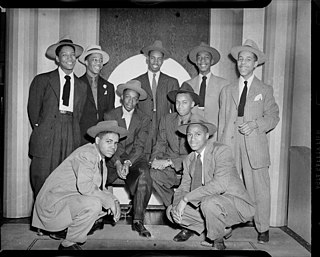
The Zoot Suit Riots were a series of riots that took place June 3–8, 1943, in Los Angeles, California, United States, involving American servicemen stationed in Southern California and young Latino and Mexican American city residents. It was one of the dozen wartime industrial cities where race-related riots occurred during the summer of 1943, along with Mobile, Alabama; Beaumont, Texas; Detroit, Michigan; and New York City.

A zoot suit is a men's suit with high-waisted, wide-legged, tight-cuffed, pegged trousers, and a long coat with wide lapels and wide padded shoulders. It is most notable for its use as a cultural symbol among the Hepcat and Pachuco subcultures. Originating among African Americans it would later become popular with Mexican, Filipino, Italian, and Japanese Americans in the 1940s.

Pachucos are male members of a counterculture that emerged in El Paso, Texas, in the late 1930s. Pachucos are associated with zoot suit fashion, jump blues, jazz and swing music, a distinct dialect known as caló, and self-empowerment in rejecting assimilation into Anglo-American society. The pachuco counterculture flourished among Chicano boys and men in the 1940s as a symbol of rebellion, especially in Los Angeles. It spread to women who became known as pachucas and were perceived as unruly, masculine, and un-American.

Zoot Suit is a play written by Luis Valdez, featuring incidental music by Daniel Valdez and Lalo Guerrero. Zoot Suit is based on the Sleepy Lagoon murder trial and the Zoot Suit Riots. Debuting in 1979, Zoot Suit was the first Chicano play on Broadway. In 1981, Luis Valdez also directed a filmed version of the play, combining stage and film techniques.

Zoot Suit Riot: The Swingin' Hits of the Cherry Poppin' Daddies is a compilation album by the American band the Cherry Poppin' Daddies, released on March 18, 1997, by Space Age Bachelor Pad Records. The album is a collection of swing and jazz-influenced songs from the band's first three studio albums, along with four bonus tracks recorded especially for this compilation.

Zoot Suit is a 1981 American independent drama musical film of the Broadway play Zoot Suit. Both the play and film were written and directed by Luis Valdez. The film stars Daniel Valdez, Edward James Olmos—both reprising their roles from the stage production—and Tyne Daly. Many members of the cast of the Broadway production also appeared in the film. Like the play, the film features music from Daniel Valdez and Lalo Guerrero, the "father of Chicano music."

The Sleepy Lagoon murder was the name that Los Angeles newspapers used to describe the death of José Gallardo Díaz, who was discovered unconscious and dying near a reservoir with two stab wounds and a broken finger in Commerce, California, United States, on the morning of August 2, 1942. Earlier, Díaz was seen at a party for Eleanor Delgadillo Coronado where he left afterwards with two friends, Luis "Cito" Vargas and Andrew Torres. He was then confronted by a group of young men from the 38th Street neighborhood, who came to the party seeking revenge for an earlier beating of some of their friends.

Luis Miguel Valdez is an American playwright, screenwriter, film director and actor. Regarded as the father of Chicano film and playwriting, Valdez is best known for his play Zoot Suit, his movie La Bamba, and his creation of El Teatro Campesino. A pioneer in the Chicano Movement, Valdez broadened the scope of theatre and arts of the Chicano community.

The 38th Street Gang is an American criminal street gang in Los Angeles, California, composed mainly of Mexican-Americans. The 38th Street Gang is one of the oldest street gangs in Los Angeles and has been occupying its territory since the 1920s. They engage in many criminal activities. The Mexican Mafia controls and routinely uses 38th Street gang members to carry out their orders.

"Zoot Suit Riot" is a song by the American ska-swing band the Cherry Poppin' Daddies, written by vocalist and frontman Steve Perry for the band's 1997 compilation album of the same name on Mojo Records.

"Zoot Suit" b/w "I'm the Face" was the first single of the British rock band the Who, who recorded it under the name the High Numbers in an attempt to appeal to a mod audience. "Zoot Suit" was written by Peter Meaden, the band's first manager. The song is a direct copy of "Misery" by the American R&B group the Dynamics, while the B-side, "I'm the Face", is a copy of Slim Harpo's "I Got Love If You Want It." The single was meant for a mod audience, but failed to chart. The band changed their name back to The Who, found new management, and released their own composition "I Can't Explain", which became a top ten hit in the United Kingdom.
A zoot suit is a style of clothing first popular in the 1930s and 1940s.
Crime in Los Angeles has varied throughout time, reaching peaks between the 1970s and 1990s.
Thomas Brown Sanchez is an American novelist.
Eduardo Obregón Pagán is the Bob Stump Endowed Professor of History at Arizona State University, and one of the hosts of the PBS popular series History Detectives since 2008.

Alice Greenfield McGrath, also known as Alice Greenfield, was an American activist who gained fame in connection with the 1942 case of the Sleepy Lagoon Murder. She was the executive secretary of the Sleepy Lagoon Defense Committee from 1942 to 1944. She later married blacklisted poet Thomas McGrath, organized a pro bono legal service organization in Ventura County, California, and led 86 missions to Nicaragua in the 1980s and 1990s.

Mexican Americans have lived in Los Angeles since the original Pobladores, the 44 original settlers and 4 soldiers who founded the city in 1781. People of Mexican descent make up 31.9% of Los Angeles residents, and 32% of Los Angeles County residents.

Down Home is an album by American jazz tenor saxophonist Zoot Sims.

The Brothers is a studio compilation album by American saxophonists Stan Getz and Zoot Sims released in 1956 via Prestige label.
This is an alphabetical index of topics related to Hispanic and Latino Americans.















